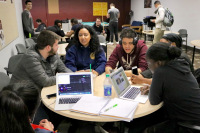Springtime on college campuses is an easy time to look forward to graduation, summer and enjoying the brief freedom from a course load for a few months. But instead of looking ahead to life outside of Fordham University, I find myself wondering what changes the school will go through in the years after my friends and I have graduated. On Monday May 1, St. Olaf College in Minnesota closed for the day because the student body held a boycott in order to draw attention to the administration’s failure to adequately address hate crimes on campus. In light of the events at St. Olaf and the resulting list of demands for better diversity awareness on the Minnesota campus, my focus has been drawn to our own university’s efforts in creating a diversity inclusive campus.
On Nov. 14, 2016, the University President’s Diversity Task force released a report through the Office of the President, including a summary and list of suggested actions to be reviewed by Fordham administration. The task force found that “There is far too much isolation and separation among departments and among schools in dealing with race and diversity. Cross-community dialogue on these issues is not plentiful either in the classroom or outside of the classroom.” The isolation makes campus wide discussions on diversity issues impractical, and thus discussion and implementation of change are far more difficult to achieve than it would with more cohesion between departments and schools. Rev. Joseph M. McShane, S.J., President of the University asserts in his response that “diversity and inclusion are institutional priorities at Fordham,” which is why he proposed and has since begun to initiate changes for the University in accordance with the recommendations of the task force. Most recently, the University announced its search for a Chief Diversity Officer, a position intended to be a special report to the president, and manage the diversity inclusion agenda at all levels of the University. I think this change will be a large step forward in unifying our campus under the mission of creating a more inclusive environment. Concerning curriculum changes, Father McShane announces the intention to lengthen, strengthen and vastly expand the New Student Orientation programs so that the accurately reflect the need for personal development throughout one’s college experience. Perhaps the most important proposal though is the suggested one-credit “First Year Experience” course that would be mandatory as a part of the core for incoming first year undergraduate students. This course would entail a “significant diversity component.”
The mandatory nature of this course confirms the seriousness with which the administration considers making Rose Hill a more diversity inclusive home for its students. In the list of demands proposed to St. Olaf administration, the organizing students request that diversity alliance programs be made mandatory before graduation, similarly to their wellness programs. Assistant Dean and Director of the Office of Mulitcultural Affairs sat down with me to discuss this among other options for change in the way the University has recently addressed the expansion of diversity. While he believes that the inclusion of a “First Year Experience” course is a strong step in the expansion of understanding among the Fordham community, he would not support compulsory alliance programming the way the programs are currently administered on campus.
There is a distinct difference between requiring a basic education of diversity awareness, and the opportunity to opt in to becoming an ally that the LGBTQ and Ally Network of Support and Racial Solidarity Network programs provide. These programs train willing participants to be accessible and empathetic allies to members of the community who feel isolated and uncomfortable as a minority on campus. To require these programs would mitigate their effectiveness and make it more difficult for those who need peer support to reach out to properly trained and willing allies for help.
In its initiation of the Diversity Task Force and prompt response announcing intentions to commit university resources to expanding diversity inclusiveness, the Fordham University administration and the Office of the President has done its duty in making the proper moves to effect change on campus. Here is where we step in.
When the University responds to student insistence on more culturally diverse programming, it is our duty as a student body that has asked for this event to actually attend. If an event isn’t sufficiently attended, it is unrealistic for the University to continue offering events that garner no student presence. Academically, this occurs when professors offer courses that highlight diversity or focus on an aspect of culture not traditionally discussed in core courses, or within the popular scope of study. If a class does not meet sufficient enrollment, it must be dropped, and the department is understandably less inclined to offer it again in the future.
While it is incredibly important for the student body to stand up and demand more diversity in courses, organizations and other university sponsored events; special engagement through the attendance of these events and enrollment in courses is imperative to their longevity on campus.
We must not only hold our administration accountable for developing programs to support the expansion of diversity inclusion, but also accept our responsibility for sustaining these programs and, therefore, a more inclusive University environment.
Ainsley Kilpatrick, FCRH ’17, is a philosophy and Spanish studies major from East Greenwich, Rhode Island.





